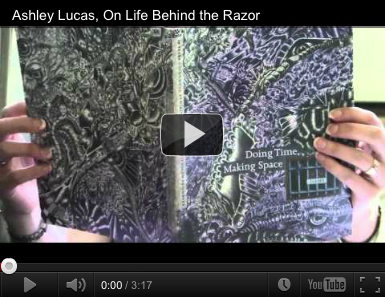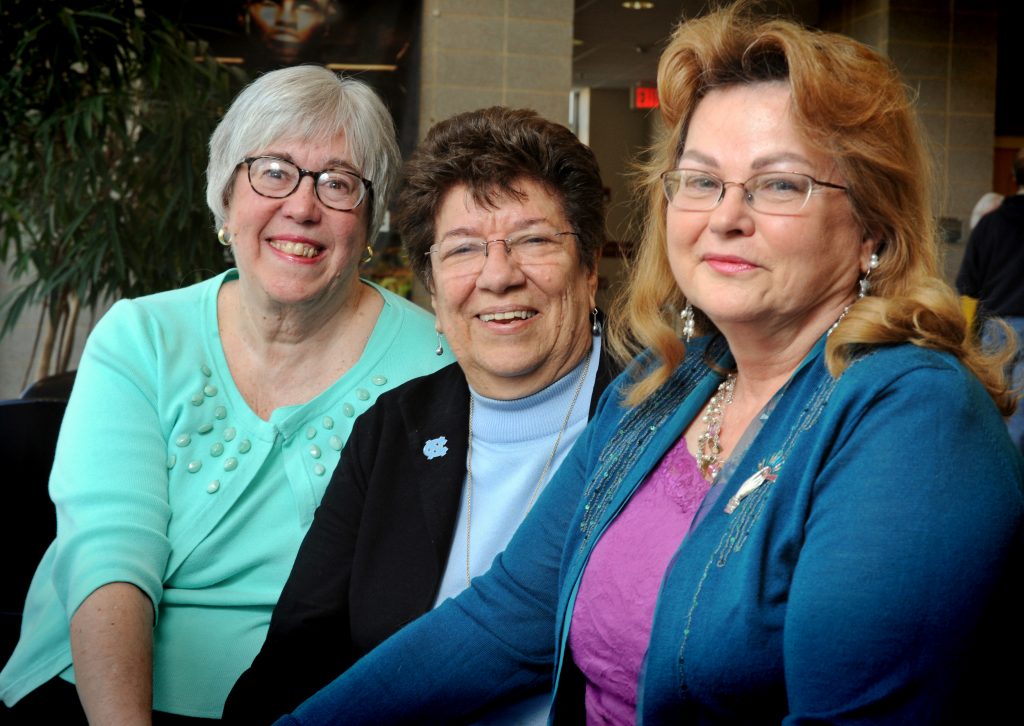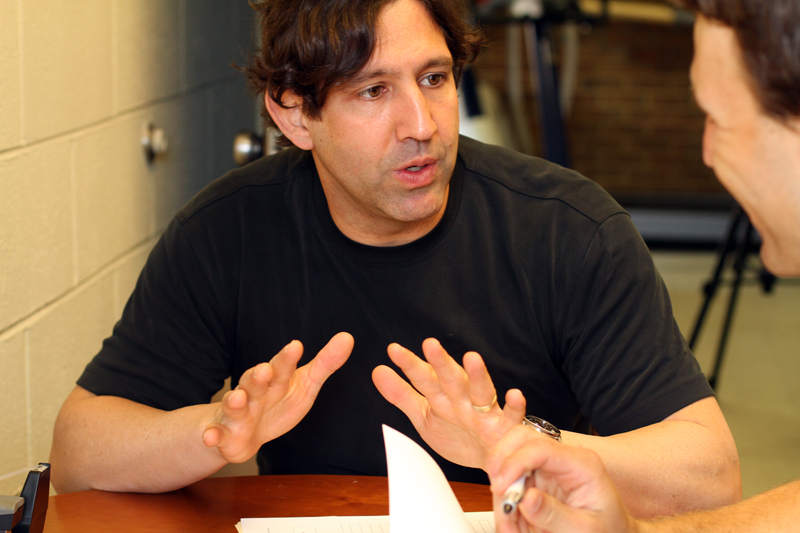[youtube]http://www.youtube.com/watch?v=Bg8Wazn-rBs&feature=youtu.be[/youtube]Jonathan Fussell (history ’98), who runs North Carolina’s largest and oldest operating winery with his brother, Dave, shows up for an interview true to his Tar Heel roots. He’s wearing a blue-checked dress shirt with a Duplin Winery logo, topped off by a Carolina belt. His smile oozes Southern charm like warm honey on a biscuit.
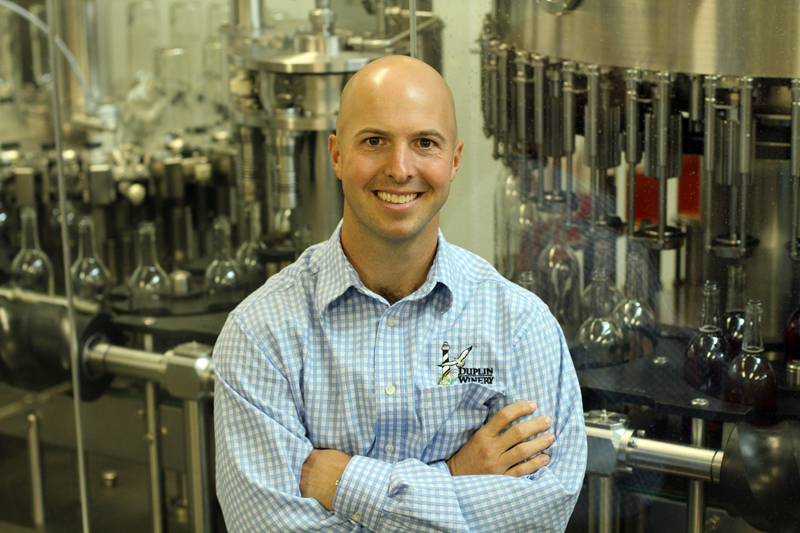
There’s an invitation to stay for lunch (fried pork chops are on today’s Bistro menu), but first a tour. If the many billboards on I-40 East pointing to exit 380 in Rose Hill are not clear enough, look for this landmark on the way to the winery: “the world’s largest frying pan,” a 2-ton, 15-foot behemoth.
“Hey, where are ya’ll from?” Jonathan asks a family touring the 92,000-square-foot production facility, which is about a half-mile down the road from the winery’s retail shop, tasting room and restaurant. The sour-sweet smell of fermenting muscadine grapes fills the cavernous space, along with the clink, clink of bottles.
Scuppernong Blush, one of the winery’s 42 varieties, is being bottled on this fall day.
“When I was in school, we weren’t far from licking the labels ourselves,” Jonathan says, shouting to be heard over the whish and whir of a large machine which today is bottling 4,920 bottles of wine per hour.
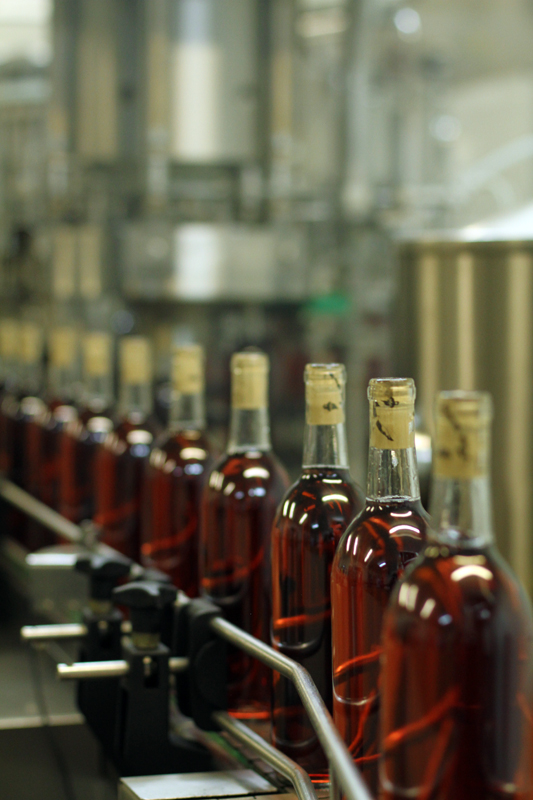
Duplin Winery may be located in a small town, but it’s having a big economic impact. Founded in 1975 by Jonathan’s dad, David, and his uncle, Dan, this family-owned business brings in about $18 to $20 million a year in retail sales, and hosts around 100,000 visitors. The winery sold about 20 cases of wine its first year and is expected to sell 360,000 to 370,000 cases during its current fiscal year, which ends Sept. 30.
Jonathan manages the retail side of the business, which includes a line of gourmet foods and frozen drinks. Dave, a 1990 East Carolina University alumnus, oversees the production side.
Jonathan broke with the longtime family tradition of attending ECU by heading to Chapel Hill. He lived in Connor dorm and was a member of Kappa Alpha Fraternity. Initially, he had no intention of returning home to the family business.
“I loved Carolina and always wanted to go there,” Jonathan says, adding that he still orders football and basketball tickets, although he often gets too busy to go to the games. “I wanted to get an education and go off and do better things — I wanted to be a lawyer. But in 1996, the winery started to grow, and I could see there was a need for me here.”
Focus on family
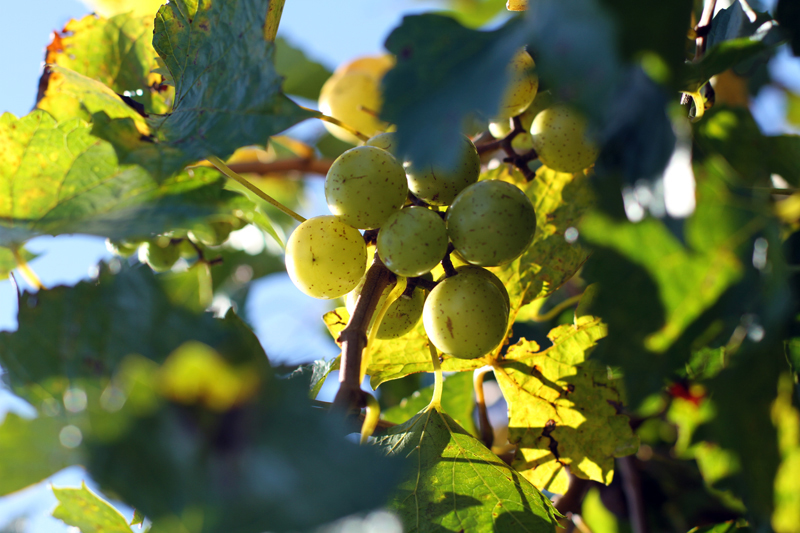
Behind the wheel of his beige Chevy Tahoe, on the way to the winery’s vineyards, Jonathan waxes philosophical for a minute — about growing up in a family business. Thirty-seven acres of “Mothervine” grapes now thrive from an initial clipping that reportedly dates to 1585, to Sir Walter Raleigh’s time. The grapes are used to produce a special scuppernong wine. In addition to more than 120 acres of vineyards in Rose Hill, the winery contracts with 47 growers across 1,800 acres in four states.
“Out of everything I’ve been given, my kids are the best thing I’ve been given,” he says, referring to Ayden, 7, and Camryn, 4. “If I could have the perfect day, it would be spending the day with them. They are what bring a smile to my face.”
That focus on family and relationships is a core part of the company’s business philosophy as well, along with the Fussells’ religious faith.
“We have three priorities: God is number one, family is number two, and business is number three. These are our core values,” Jonathan says. “We are a business, but the business is [made up] of people who work here and people who visit here. When you walk through that door, Aunt Jo greets you. We want you to feel like you’re a part of the family.”
Dennis Sutton, a professor and head of the viticulture program at nearby James Sprunt Community College, also is a part-time employee at Duplin Winery. He echoes the sentiment of Duplin’s family-oriented atmosphere.
“Every day I’ve worked, they do a [group] ‘line-up,’ and the retail room manager always asks at the end, ‘Is there anything anyone wants to add?’ And people will say things like, ‘My kid’s on the state championship football team,’” Sutton says. “And it’s a rare sight to see [customers] come in and not leave with a bottle or two of wine. It’s Southern hospitality, and Duplin has set the bar.”
Jonathan’s appetite for business started early. He grew up playing hide-and-seek behind the wine tanks (He claims that brother Dave once locked him in one). He got paid for his first winery job at age 5.
“We used to make wooden boxes that we’d put our wine in, gift boxes with a rope handle,” he says. “I remember tying rope handles, 10 cents for every handle. My mom thought I would do five an hour, but I was doing 50 an hour. I always loved being a part of it, but your childhood is different because I always saw my parents at work. But without my father making the sacrifices he made, I wouldn’t be in this business today.”
Conservative growth strategy
The Fussell family knows all about sacrifices. In the early ‘80s, they lost nearly everything they owned when North Carolina ruled that preferential tax laws that had been established by the state to promote grape growing and winemaking were unconstitutional. Sales dropped. But from the depths of rock bottom, the winery began to climb back up. Those hard times influence Duplin’s growth strategy today.
An amphitheater opened last year on a site several miles down the road, closer to the interstate, where eventually the brothers hope to build a new winery, a hotel, an events center and a spa.
“This is a 10-year plan,” Jonathan says. “What shaped who we are is when we almost went bankrupt. We don’t want to borrow money to grow.”
For the past three years, Duplin Winery has won the Impact Hot Brand Award, a key industry honor. When people ask him why the winery continues to do well, at first Jonathan says “pure luck.” But it also comes full circle, back to family and relationships.
“We have great folks who work for us, folks that care about the company. They are the ones who’ve done it.”
Duplin County Manager Mike Aldridge has his own theory about the secret to Duplin Winery’s success.
“I think the main ingredient has been persistence, their stick-to-it-tive-ness. They have really put their heart and soul into making this business what it is. I think they’re just getting started.”
[ Story by Kim Weaver Spurr ’88, video by Mary Lide Parker ’10, spring ’12 Carolina Arts & Sciences magazine. For more, visit http://www.duplinwinery.com. ]

